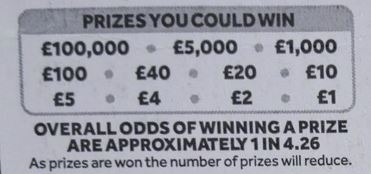Expensive vs Cheap Scratch Cards: Are Chances of Winning Higher?
Scratchcards are a familiar option when it comes to instant win games in the UK. Found in most newsagents and supermarkets, they allow you to reveal the outcome straight away, just by scratching the surface.
But with various price points—such as £1, £2, £3, and £5—it’s common to wonder whether spending more increases your chances of a win, or if it simply means the potential prize could be larger.
In this blog, you’ll find out how scratchcards actually work, how the odds are set, and how to make sense of what each card offers. If you’ve ever stood at the counter wondering which card to pick, this guide may help you understand the options better.
Scratchcard Odds Explained: What Affects Your Chances?

Every physical scratchcard has a pre-printed outcome—either a win or a loss—determined during production. These cards are then randomly distributed across retailers, so no one knows where the winning cards will end up.
Odds are printed on the back of each card and show how likely it is to win any prize, not necessarily more than your stake.
For example, odds of 1 in 4 mean that over the full print run, one in every four cards might win something—but that doesn’t guarantee a win after buying four.
As of October 2024, you’re limited to 10 scratchcards per transaction when buying in-store. This applies to all National Lottery retailers and supports safer gambling.
Do More Expensive Scratchcards Have Better Odds?
Not necessarily. While some £5 scratchcards might show slightly better odds than cheaper ones, this varies by game.
For instance, one £5 card might offer odds of 1 in 3.5, while a £2 card may be 1 in 4. Each game has its own structure, so price alone doesn’t determine your chances.
To compare fairly, check the odds printed on the back of each individual card. These figures won’t change after distribution.
Is the Prize Size Bigger on £5 and £10 Scratchcards?
Yes, £5 scratchcards tend to offer higher top prizes. A £1 card might offer a top prize of £10,000, while £5 cards can sometimes reach up to £1 million, depending on the game.
However, larger prizes are harder to win, and each game has a set number of top prizes. The Odds of winning the top amount are usually much longer than the odds of winning any possible prize. Details of the prize tiers and how many are available should be printed on the card or published online.
Note: £10 scratchcards were withdrawn and are no longer sold in the UK due to concerns over gambling-related harm.
Cheaper Scratchcards: Are They Worth Playing?
Cheaper scratchcards—such as those costing £1 or £2—usually offer smaller prize amounts and simpler gameplay.
For example, a £1 card might offer a top prize of £10,000, while a £2 card could go up to £100,000. While these amounts may be lower than what you’d typically find on £5 cards, the odds of winning any prize can sometimes be quite similar.
These lower-priced cards may not offer any extra features, like bonus rounds or multiple play areas, but that doesn’t necessarily make them less appealing. For some, the straightforward format and lower cost make them a more comfortable choice.
Whether cheaper cards are “worth it” really depends on what you’re looking for. If you prefer spending less and don’t mind smaller potential prizes, they may suit you well. Others might prefer the added features or prize potential found on more expensive cards. Whichever you prefer, it may be a good idea to check the odds and prize structure on the back of each card before you buy.
What Do You Actually Get for Paying More?
Paying more for a scratchcard doesn’t guarantee a win—or more prizes.
A £5 card may offer larger potential prizes, or added features like bonus games, but these are part of how the game is designed, not a sign of better odds.
The outcome of each card is decided before it reaches the shop and isn’t influenced by the price. So, while more expensive cards might seem to offer “more”, this only applies to how the game looks or what it has the potential to pay out—not what it will.
You could still win nothing, regardless of how much you spend. Always check the odds and decide what suits your budget and preferences.
The Bottom Line: Are More Expensive Scratch Cards Better?
Scratchcards are based entirely on chance. No card can guarantee a win, and there’s no strategy to improve the odds.
What makes a scratchcard “better” depends on your preference—whether that’s spending more for a larger possible prize, or less for a simpler experience.
Whichever you choose, it’s important to set a budget, read the odds, and avoid spending more than you’re comfortable with.
If gambling ever stops being enjoyable, help is available at GamCare.
*All values (Bet Levels, Maximum Wins etc.) mentioned in relation to these games are subject to change at any time. Game features mentioned may not be available in some jurisdictions.
**The information provided in this blog is intended for educational purposes and should not be construed as betting advice or a guarantee of success. Always gamble responsibly.

